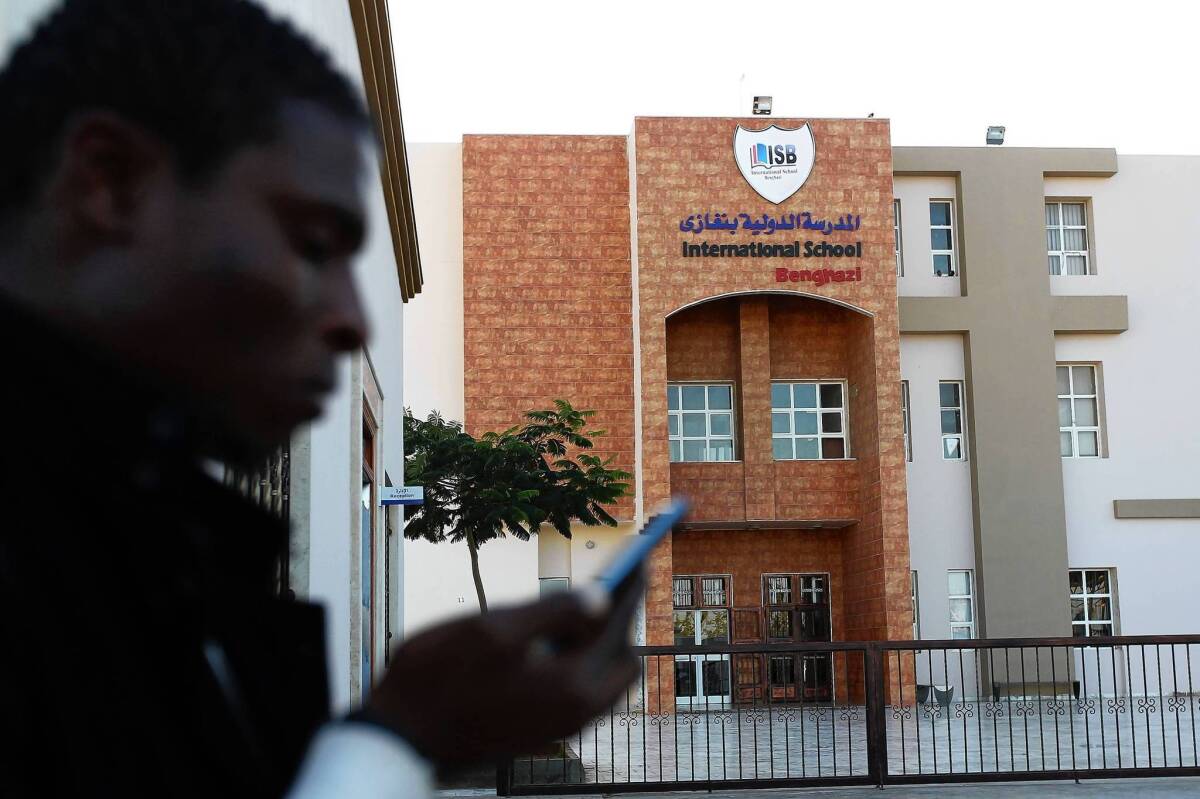American teacher killed in Libya is remembered as devoted, irreverent

- Share via
BENGHAZI, Libya — Relatively few Americans remained in this eastern Libyan city as street battles raged and Islamic militants made ever-bolder forays in recent weeks. But Ronnie Smith, a chemistry teacher at an English-language school, stayed on, planning, colleagues said, to return soon to the United States for Christmas.
Smith, 33, of Texas was gunned down Thursday by an unknown assailant or assailants as he jogged in an affluent central neighborhood of Benghazi, not far from the U.S. Consulate where an attack in September 2012 killed Ambassador J. Christopher Stevens and three other Americans.
Shaken colleagues at the International School, which has an American-style curriculum, said they were told by school administrators that Smith had been shot multiple times as he was taking a run that, they said, was part of his regular routine. There was no immediate claim of responsibility in the attack, and it was not known whether Smith was targeted as an American, as a Westerner or at random.
Students and friends reminisced about Smith on Twitter, describing a teacher who was devoted and irreverent. Rahman Bader, one of Smith’s students, remembered his teacher “telling us about how he met his wife and i was like ‘sir shes miles out of your league’ and he was like ‘i know I know.’ ”
Logan Gentry, a friend who said he talked to Smith the day before he died, said in an email that “when I read the student’s memories of him on the hashtag #MrSmithMemories, I hear his sarcastic, jovial voice. He joked with everyone, but always cared for them and looked for ways to serve them.”
Smith arrived in Benghazi late last year and had a wife and young son. Their whereabouts after the shooting were not clear, and American diplomats refused to provide any family details or even confirm Smith’s identity. A U.S. official in the region acknowledged the death of an American national in Benghazi but referred all questions to Libyan authorities.
In Washington, State Department spokeswoman Marie Harf confirmed that teacher Ronald Thomas Smith II was shot and killed in Benghazi.
“We offer our condolences to the victim’s family, friends and loved ones,” Harf said. “We are in contact with the family and are providing all appropriate consular assistance.”
Harf said the United States has an ongoing advisory warning U.S. citizens against all travel to Benghazi, Bani Walid and southern Libya. The U.S. also advises against any but essential travel to Tripoli, the capital, she said.
Libyan officials said three Libyan soldiers also died in or near Benghazi on Thursday. The escalating militia battles that have rocked the city and its environs since early last month are emblematic of the central government’s weak authority. Authorities in Tripoli have tried to halt the fighting, but those efforts have been largely ineffectual.
East of Benghazi, in Derna, jihadist groups have in effect taken over, and Prime Minister Ali Zidan is weighing a military intervention, which residents have demanded.
In Benghazi, the militias sometimes target security forces, with assassinations a favored tactic. But the groups — many of them made up of former rebels who brought down and killed longtime Libyan leader Moammar Kadafi in 2011 — are also locked in competition among themselves for influence and territory.
The September 2012 consulate deaths were in the headlines again last month, when the CBS newsmagazine “60 Minutes” suspended correspondent Lara Logan for an erroneous report on the events that led to Stevens’ death. An internal report found that Logan and her team had relied heavily on information provided by a security contractor named Dylan Davies, whose account was later discredited.
Special correspondent Juma reported from Benghazi and Times staff writer King from Cairo. Times staff writers Maria L. La Ganga in Seattle and Molly Hennessy-Fiske in Houston contributed to this report.
aria L. La Ganga in Seattle and Molly Hennessy-Fiske in Houston contributed to this report.
More to Read
Sign up for Essential California
The most important California stories and recommendations in your inbox every morning.
You may occasionally receive promotional content from the Los Angeles Times.













